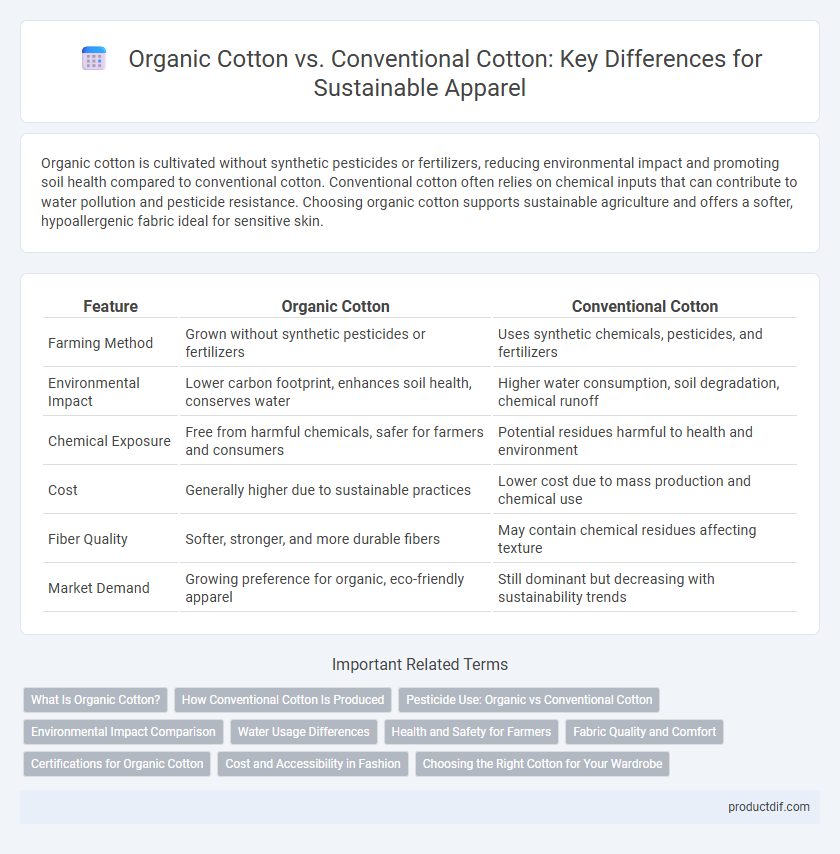Organic cotton is cultivated without synthetic pesticides or fertilizers, reducing environmental impact and promoting soil health compared to conventional cotton. Conventional cotton often relies on chemical inputs that can contribute to water pollution and pesticide resistance. Choosing organic cotton supports sustainable agriculture and offers a softer, hypoallergenic fabric ideal for sensitive skin.
Table of Comparison
| Feature | Organic Cotton | Conventional Cotton |
|---|---|---|
| Farming Method | Grown without synthetic pesticides or fertilizers | Uses synthetic chemicals, pesticides, and fertilizers |
| Environmental Impact | Lower carbon footprint, enhances soil health, conserves water | Higher water consumption, soil degradation, chemical runoff |
| Chemical Exposure | Free from harmful chemicals, safer for farmers and consumers | Potential residues harmful to health and environment |
| Cost | Generally higher due to sustainable practices | Lower cost due to mass production and chemical use |
| Fiber Quality | Softer, stronger, and more durable fibers | May contain chemical residues affecting texture |
| Market Demand | Growing preference for organic, eco-friendly apparel | Still dominant but decreasing with sustainability trends |
What Is Organic Cotton?
Organic cotton is grown without synthetic pesticides, fertilizers, or genetically modified organisms, ensuring a sustainable and eco-friendly farming process. It uses natural methods like crop rotation and compost to maintain soil health and reduce environmental impact. Brands adopting organic cotton promote healthier ecosystems and safer products for consumers sensitive to chemicals.
How Conventional Cotton Is Produced
Conventional cotton is produced using synthetic pesticides, herbicides, and fertilizers to maximize yield and control pests, often leading to significant environmental pollution and soil degradation. Large-scale monoculture farming techniques consume substantial water resources, contributing to water scarcity in cotton-growing regions. This intensive agricultural practice typically involves genetically modified seeds to enhance pest resistance and increase productivity, impacting biodiversity and ecosystem balance.
Pesticide Use: Organic vs Conventional Cotton
Organic cotton farming eliminates synthetic pesticide use, significantly reducing environmental harm and health risks to farmers compared to conventional cotton, which relies heavily on chemical pesticides. Conventional cotton cultivation consumes nearly 24% of global insecticides and 11% of pesticides, despite being grown on only 2.5% of agricultural land, contributing to soil degradation and water contamination. Choosing organic cotton promotes sustainable agriculture by minimizing toxic chemical exposure and preserving ecosystems.
Environmental Impact Comparison
Organic cotton cultivation reduces water usage by up to 91% compared to conventional cotton, significantly lowering environmental strain. It avoids synthetic pesticides and fertilizers, preserving soil health and biodiversity while reducing carbon emissions by approximately 46%. Conventional cotton contributes to 24% of global insecticide use, posing risks to ecosystems and increasing pollution.
Water Usage Differences
Organic cotton cultivation uses approximately 91% less water than conventional cotton due to natural rainwater reliance and efficient soil moisture retention techniques. Conventional cotton requires about 10,000 liters of water per kilogram, contributing to significant freshwater depletion in major growing regions. Sustainable apparel brands increasingly favor organic cotton to reduce environmental impact and promote water conservation.
Health and Safety for Farmers
Organic cotton farming minimizes farmers' exposure to harmful pesticides and synthetic fertilizers, significantly reducing health risks such as respiratory issues and skin diseases. Conventional cotton relies heavily on chemical inputs that contribute to toxic poisoning and long-term health problems among agricultural workers. Implementing organic practices fosters a safer working environment, promoting better overall health and safety standards for farmers.
Fabric Quality and Comfort
Organic cotton fabric is often softer and more breathable due to the absence of chemical pesticides and synthetic fertilizers, which helps retain the cotton's natural fibers' integrity. Conventional cotton may undergo treatments that can reduce fabric softness and cause potential skin irritation. Consumers seeking high-quality, comfortable apparel frequently prefer organic cotton for its superior texture and hypoallergenic properties.
Certifications for Organic Cotton
Organic cotton is certified by globally recognized standards such as GOTS (Global Organic Textile Standard), OEKO-TEX, and USDA Organic, ensuring rigorous ecological and social criteria throughout production. These certifications verify absence of synthetic pesticides, use of sustainable farming practices, and fair labor conditions, distinguishing organic cotton from conventional cotton grown with chemical inputs. Brands leveraging certified organic cotton demonstrate a commitment to environmental sustainability and transparency in the apparel supply chain.
Cost and Accessibility in Fashion
Organic cotton typically incurs higher production costs due to sustainable farming practices and limited supply, resulting in increased prices compared to conventional cotton. Conventional cotton remains more accessible and affordable for fashion brands and consumers, benefiting from established supply chains and large-scale cultivation. Consumers prioritizing budget often favor conventional cotton, while organic cotton attracts those seeking eco-friendly apparel despite its premium cost.
Choosing the Right Cotton for Your Wardrobe
Organic cotton is cultivated without synthetic pesticides or fertilizers, reducing environmental impact and promoting sustainability in your wardrobe choices. Conventional cotton often involves intensive chemical use, which can affect soil health and water quality, making organic cotton a preferable option for eco-conscious consumers. Selecting organic cotton garments supports ethical farming practices and offers softer, hypoallergenic fabric ideal for sensitive skin.
Organic Cotton vs Conventional Cotton Infographic

 productdif.com
productdif.com